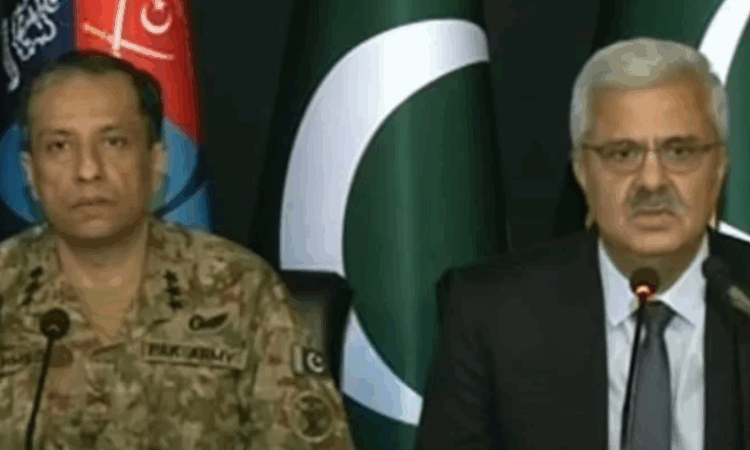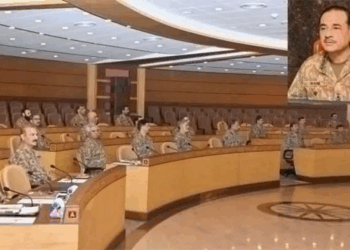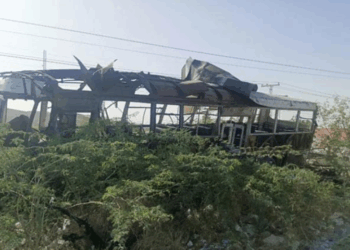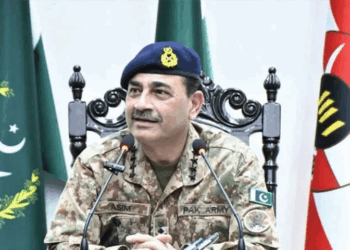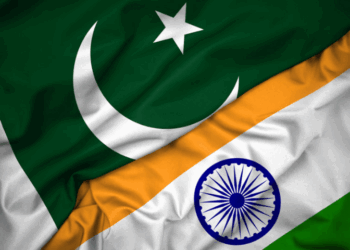Islamabad, May 23, 2025: Pakistan’s Interior Secretary Captain (retd) Khurram Muhammad Agha on Thursday condemned the recent terrorist attack in Khuzdar, vowing a “decisive response” and attributing the assault to the group Fitna al-Hindustan, which officials claim operates under Indian direction.
Addressing a joint press conference with Director General Inter-Services Public Relations (DG ISPR) Lieutenant General Ahmed Sharif Chaudhry, Agha stated that the attackers deliberately targeted schoolchildren, characterizing the assault as not only a terrorist act but an attack on Pakistan’s cultural and educational values.
“Our response will be decisive. They will not succeed,” said Agha, adding that the state retains full capability to neutralize those behind such atrocities.
Key points from the press conference:
- Continuing Indian strategy: Captain (retd) Agha described the Khuzdar incident as part of a broader Indian subversive agenda, claiming India has escalated efforts through proxies following the failure of Operation Sindoor.
- Targeting civilians: He alleged the perpetrators now attack “soft targets” after failing to harm strategic infrastructure.
- Deliberate destabilization: The Interior Secretary accused Fitna al-Hindustan of working to destabilize regional peace and manipulate young minds.
DG ISPR Lt Gen Ahmed Sharif Chaudhry supported these claims, reiterating that Pakistan has presented evidence of Indian-sponsored terrorism at international forums, including the UN (2015 and 2019) and directly to India at Sharm El Sheikh in 2009.
“India has been involved in state-sponsored terrorism in Pakistan for over two decades,” said Chaudhry.
He listed a series of recent attacks allegedly linked to Indian-backed groups:
- April 12, 2024: 12 labourers killed in Nushki
- April 28: 2 labourers killed in Tump, Kech
- May 9: 3 barbers killed in Lasbela
- May 21: 6 children martyred in Khuzdar, 51 still critically injured
The DG ISPR also mentioned the Jaffer Express bombing and a failed drone attack on Nankana Sahib, both attributed to Indian elements. He accused India of celebrating such attacks through its media and social platforms.
Lt Gen Chaudhry alleged that thousands of social media accounts operated by Indian intelligence agencies are part of a coordinated propaganda effort, citing groups like DisinfoLab. He also aired clips from surrendered militants who confessed to receiving funds from Indian handlers.
“India is not just supporting proxies; it is actively orchestrating terror through technology, media, and manipulation,” he said.
He claimed some groups are blackmailing young girls into becoming suicide bombers and called these elements “Khawarij,” a term historically used to describe extremist rebels.
Both officials emphasized that ongoing development in Balochistan is a key reason for the spike in attacks.
“Progress in Balochistan threatens the narrative of separatist elements backed by India,” said Chaudhry, adding that the region’s people are increasingly rejecting the separatist agenda.
He clarified that Balochistan’s diverse ethnic composition is well-integrated into national politics and dismissed separatist slogans as “hollow and misleading.”
The DG ISPR warned Afghanistan not to serve as a tool for Indian interests. While reaffirming historical goodwill towards Afghans, he stressed that Pakistan’s national security remains paramount.
“Afghanistan must not become the executor of India’s destabilizing designs,” he said.
Referring to the attempted drone strike on Nankana Sahib, Chaudhry emphasized that Pakistan does not target religious sites and continues to protect Sikh pilgrims and heritage.
“Pakistan acts with restraint. But any miscalculation about our internal unity or military resolve should now be dispelled,” he concluded.


